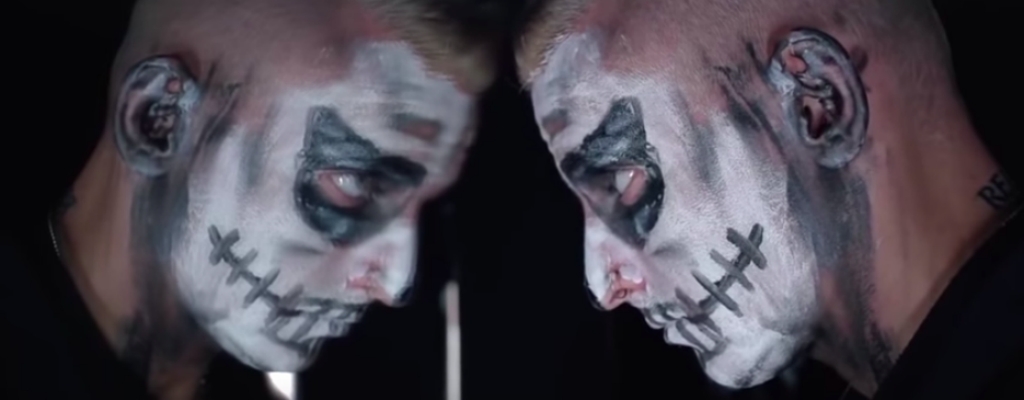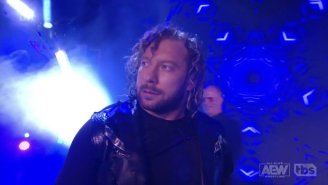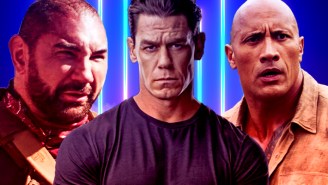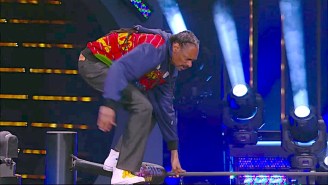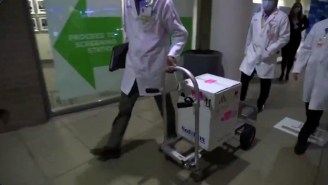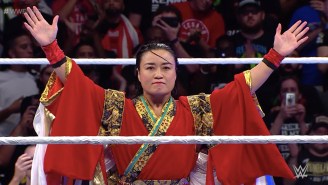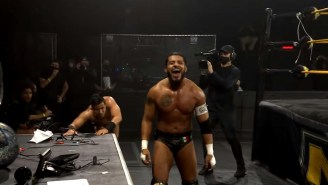In the months All Elite Wrestling has existed, Darby Allin has become one of the promotion’s fastest rising stars. After winning over fans this summer in his time-limit draw with Cody at Fyter Fest and the Cracker Barrel Clash at All Out, he became the first challenger of AEW World Champion Chris Jericho. During a brawl at the end of the same episode of Dynamite in which become number one contender, Allin skateboarded down the entrance ramp and clocked Jericho with his board. The crowd loved it.
Years before he started entertaining TV audiences, Allin stood out on the independent wrestling scene, helped by his goth-skater persona, unique brand of charisma, and willingness to take crazy bumps. The Seattle native got his start wrestling in front of the denizens of Washington state, and before he left the indie scene for TNT, he wrestled a farewell match to his local wrestling scene at Defy Wrestling’s Doomsayer event on September 27. I interviewed him for UPROXX after the show, and he opened up about creativity, his career goals, and more.
. @DarbyAllin is ready for @IAmJericho next week in Philadelphia! #AEWDynamite pic.twitter.com/H0o3wf1jGO
— All Elite Wrestling (@AEW) October 10, 2019
“My last indie match is tomorrow night,” he tells me backstage afterward. “Last Seattle indie though. So it’s, like, local. It probably means more tonight than tomorrow.” Allin’s last indie match in his home state clearly meant a lot to the fans in attendance, too. Several members of the audience were wearing Allin’s signature half-skull face paint; I saw some applying it outside of Washington Hall as I arrived at the venue.
When the building, now a registered city landmark, host of theatrical productions, and a home for Defy since the company was founded in 2017, was commissioned by the Danish Brotherhood in America in 1907 as a “fraternal lodge and dance hall,” I’d guess that skeleton face paint solidarity wasn’t the type of display of comradery they had in mind for Washington Hall, but fraternity was on display at Doomsayer. With his wiry build and unusual ring gear – denim or denim-looking short-shorts with black leggings underneath (“It’s comfortable as shit,” is how Allin explains this costume choice), he doesn’t look like most people’s mental image of a professional wrestler, but it’s undeniable that he’s one with whom fans have connected. To some, he might be more of a weirdo to ogle, but to many, he’s relatable and a minor outsider icon.
Doomsayer started forty minutes late because the fire alarm went off (back inside after the fire department gave the all-clear, we learned this was caused by someone smoking weed in the bathroom, something people I was texting told me was “very Seattle”) and cut out its intermission, but that didn’t cool down the crowd for Darby Allin’s second-to-last indie match, which was the second-to-last match on the card.
Allin’s opponent was “Classic” Cody Chhun, a clean-cut up-and-comer billed from Scranton, Pennsylvania, and trained in Washington. The audience was loud and emotional from Allin’s entrance. Allin looked emotional as well, almost overcome during the standoff after the match’s fast-paced open sequence.
It seemed like this would be a competitive and respectful bout in which a relative veteran of the scene would put over a potential future star on his way out of the territory, most likely going out on his back per wrestling tradition. However, there was a twist. The matched stopped when Chhun got hurt, possibly for real. The referee started helping him to the back. This might be the actual, unfortunate ending to this match and to Allin’s career as an independent wrestler in his home state.
But then Allin took hold of the microphone. He said Chhun had been calling him out for this match – is that how he wanted it to end? “There’s a reason you’ve been wrestling in the Pacific Northwest your whole career,” Allin said, the local hero showing his true colors as he left for the big leagues. “You’re going to die here. Your career won’t amount to shit.”
This motivated Chhun to get back in the game. He snapped and started beating up Allin and the match was back on, now soundtracked by chants of “F*ck him up, Cody!” and “Cody, Cody, Cody f*cking Chhun!” The fans understood the new story of Allin’s last match, understood their role in it, and were more than willing to participate in heightening the drama.
Said drama continued after Chhun defeated Allin. The AEW wrestler took the microphone once again and talked about how bad the Washington indies were when he started wrestling. He praised Defy as the only legit company in the Pacific Northwest and told Chhun that they were giving him top talent from around the world to work with, so “It’s up to you and only you” if he makes the best of them. Chhun grabbed the mic (“Deadass, I’ma get yelled at because we’re on a time crunch”) and the proverbial brass ring at the same time, declaring that he wanted to be booked at PCW Ultra. Days later, the California promotion – with whom Defy is friendly – announced Chhun’s PCW debut as part of a “Young Guns” six-man scramble. The cycle of wrestling life was perpetuated.
Backstage after Doomsayer was over, Allin tells me he picked Chhun as his opponent for his last local indie match, “Because, like, after I saw him train for the first time – I saw his first day of practice – I thought he had a world of potential and I was like, ‘Dude, like, this guy needs, like, something to break him through to the next level…’ He’s the only local guy that I feel like right now has an opportunity to, like, break through to that next level.”
I told Allin that as someone who grew up in Washington, I remembered that, basically like he said in his promo, there used to be almost no indie wrestling in the area. “There was none,” Allin concurs, “and then the ones that there were just treated you like total dogshit. Like, you’d go there and they would make you set up a ring or be a security guard for a year when people on the show were dogshit wrestlers. Like, hey, just give me a chance! You know what I mean? Just a bunch of assholes.”
Allin thinks the local wrestling scene started to improve after he moved out of the state. “I heard of this company, Defy, and I literally thought it was just going to be another shit show Seattle promotion. I was like, ‘Oh god, here we go again,’ you know what I mean? But then they had, like, I remember they had Cody Rhodes on the first show and they had Matt Cross on the first show… I was like, ‘Oh, this seems different.’ Then I started hearing about Washington, like Defy and what they’re doing, all the way over in Florida and then the whole wrestling scene started taking notice of Defy.”
In addition to Defy, Allin has wrestled for the Seattle-based 3-2-1 Battle! and Everett’s Without A Cause. He thinks the Washington scene is stronger than it used to be. “I feel like now the local people, instead of doing one show a month, they can do four shows a month. There’s a lot more avenues and, like, ring time they can definitely get, so it’s definitely stronger as a whole.”
Allin was never content to be A Local Guy. One of the ways he’s made himself stand out is through his self-promotion, especially his black-and-white videos that have included not just wrestling promos, but Allin doing things like spray-painting words on his car (“Loser,” “Champ,”) and doing skateboard tricks. “I went to film school,” Allin replies when asked how he came up with the idea for these vignettes. “I’ve been doing film my whole life, and then I dropped out of film school. But I always felt wrestling needed more, like, character people, because there’s a lot of people who go out there and just do moves and there’s no, like, rhyme or reason to why they are the way they are. So when I saw that, I was like, ‘Dude, I just want to tell everybody, like, who the f*ck I am and have a lot more in-depth character.’ There’s only one way to do that and that’s yourself.”
Allin says his character does come from himself and has been built through his real life experiences. “A lot of people start wrestling when they’re eighteen or something like that. I started wrestling when I was twenty-one and people are like, ‘Do you wish you started when you were eighteen?’ And I’m like, ‘no,’ because from the age of eighteen to twenty-one there’s crazy shit that happened in my life that, like, shaped me. If I started when I was eighteen, I probably would have been, like, just an average wrestler, you know, wearing tights or some shirt, with like no story or anything like that, but a lot of shit happened in those two years before I started, so I just took my life experiences and I put it into my wrestling.”
Allin describes wrestling as “therapeutic” and says the reason he decided to start doing it in the first place was because it’s an outlet unlike any other art form. “It’s like the shit that I love in moves, but in front of an audience. You beat the f*ck out of each other and it’s just fun. It’s seriously the only thing of its kind. Because you can do plays, you can do Broadway, but you’re not going like fly through a table or something like that, you know what I mean? It gives you that rush. Because I like living, like, risky, like doing crazy shit. I used to do crazy shit by myself all the time, so now I can do it in front of an audience.”
When did filming promos become so sketchy?!?!?! pic.twitter.com/hLVR1zkA3m
— DARBY ALLIN (@DarbyAllin) April 10, 2019
Before he started wrestling, Allin’s love of taking risks manifested in his skateboarding. Videos of his skating got him featured on Tony Hawk’s YouTube channel and sent some free boards, but Allin decided to cut down on it when he started to get serious about wrestling. He says his reasoning was that “I can’t afford to break my ankle like I was doing every week with skateboarding.”
Allin’s skateboarding past has produced some of his craziest and most memorable wrestling moments, like the times he’s attached tacks to the bottom of the deck and jumped onto opponents. He says he decided to incorporate skating into his wrestling because “I feel like wrestling needs more outside influences brought into it, because a lot of people just recycle wrestling back into wrestling and I feel like it just gets kind of, like, stale at times, but if you do something with a skateboard, for example, people are like ,’What the f*ck is that?’ and it’s going to get people talking.”
Another part of Allin’s real life that’s been incorporated into his wrestling character is the time he spent living in his car. “I was homeless because I wanted to be homeless,” he says of this period of his life. He had decided to start training with AR Fox in Atlanta, Georgia because he wasn’t getting what he wanted out of living in Florida and Fox trained every day. Allin wanted to get as much ring time as he could at Fox’s school, but “I didn’t want to be a freeloader, so I didn’t want to stay at anybody’s house, so I was just homeless.”
“I told myself, ‘If I don’t make something out of wrestling, I deserve to be homeless,'” explains Allin. “I was like, ‘Then one day, I’ll be able to move out of my car and actually into a house, but it’s only through hard work.’ I didn’t want to ask for any favors or anything like that, so I just chose to be homeless until I started to get money.”
The stunts, the sacrifices, and the intensive training were all part of Allin’s goal to advance his career as quickly as possible. “I was like, ‘I’ve got to do something, and I’ve got to do it quick,'” he says, “So I just do these crazy things to get buzz and then you show people you can actually wrestle.”
It was one of those matches that showed he could actually wrestle that Allin says led to him being signed by All Elite Wrestling. AEW officials took notice of him when they saw his match against Pentagon Jr. in Northeast Wrestling, a New York-based indie. “For a long time, I had this stereotype of I just do crazy bumps. I just do crazy bumps. That’s all I do. Then they actually, like, saw that match – because I don’t think anybody had been paying attention to what I was doing at Evolve because no one watches Evolve – so then after they saw that match, they said, ‘Oh yeah, this guy can actually do shit. Let’s hit him up.'”
Evolve may not be the biggest indie right now, but it has become known as a feeder promotion for WWE. Its shows now often feature WWE NXT performers, it has hosted NXT title defenses, has streamed on the WWE Network, and this past weekend, an Evolve show included Shotzi Blackheart being presented with a WWE contract. Allin says he knows working for Evolve got WWE’s eyes on him, “But at the same it, it wasn’t building your career. Because, the thing is, I wrestled Adam Cole there and then I checked my Twitter expecting a lot of people to be talking about the match. Only two people were talking about that match on Twitter and at that time I saw the writing on the wall that being here isn’t going to help your name value at all. You’re not going to get more followers. You’re not going to get more buzz.”
Allin says at that point he “mentally checked out” and when he was offered the opportunity to start training at the WWE Performance Center, he turned it down. “There’s a million guys there who are never going to see the light of day. It’s not worth it. So I was like, ‘I’m not even interested.’ I’m not the type of guy who wants to sit on the sidelines and say, ‘Gee, I’m just happy to be in WWE.’ I don’t give a f*ck.”
Fans shouldn’t hold their breaths for Allin to sign with the industry giant in the future either, because his long-term career goal is outside of the professional wrestling business. “My whole thing is I want to get out of wrestling sooner than later and go into film full time and direct my films that I’ve always wanted to direct, but now I’ve got more eyes on me, so they’ll be like, ‘Oh shit, it’s Darby and he’s making films. Let’s check it out.’ Even if they don’t know what the f*ck it’s about, they’re still going to check it out, you know what I mean?”
Allin says he has “no idea” how long he’ll continue to wrestle and he could even leave the business as soon as next year. “I’ll be here as long as I feel like I can be creative and be myself. The moment I stop feeling like myself I mentally check out. Like I said, I’m totally fine living in my car. I don’t give a f*ck. I’m not playing anybody’s games.”
In AEW so far though, he’s felt like he’s had “one hundred percent” creative freedom. He also thinks “it’s just a matter of time” before some of his film work appears on Dynamite, though he adds, “We’ll see how everything works out, because I think us as the roster still doesn’t know how the hell everything’s going to work out yet” in these “early stages” of the company.
While he has creative freedom now, Allin says that in the early stages of his indie career, he had to stay committed to sticking to his guns and not changing who he was. He was criticized not just for his creative impulses, but his physical appearance. But Allin says that was nothing new. “It’s fine, you know what I mean? I’ve dealt with that shit my whole life, you know, even from being, like, younger. People were like change your hair, change the music you like, change your clothes. I don’t give a f*ck, dude. They’re not going to be around when I’m on my deathbed.” He says that when he signed with AEW, it silenced most of those who thought he didn’t belong in wrestling. “For some reason, people were just like, ‘F*ck it, he’s here for a reason.'”
Since he’s been in AEW, though, many have continued to comment on Allin’s willingness to take those crazy bumps for which he’s become known, some saying his career will be shortened by the toll on his body. Of these people, Allin says, “They don’t know shit. Because I’ve been doing this shit to my body from skateboarding.”
“And that’s the thing,” Allin continues, “is people are so small-minded in f*ckin’ wrestling. The fans. Everyone’s so small-minded. They forget that we’ve had a life outside of wrestling. God forbid, you know what I mean? I’ve been falling on concrete my whole life and I’m still standing perfectly fine, so with or without wrestling, I’d still do stunts, so just, you know, mind your own business and get the f*ck out of my face.”
https://www.youtube.com/watch?v=1i3ziTtpOvM
Allin’s wife, Priscilla Kelly, has also received criticism, most notably after her infamous tampon spot at Suburban Fight. Allin thinks the outrage to this from some fans and industry veterans was an example of “small-minded” thinking in wrestling. “Like, you take a Hollywood movie like 21 Jump Street and at the end of the movie the guy’s getting his dick cut off, and then they show the dick in the street and it’s a multi-million-dollar movie and people are like, ‘Ahaha, that’s awesome.’ But then you do something like the tampon thing in wrestling and everyone’s like ‘(sobbing) How dare you?'”
I ask Allin why he thinks moments like Kelly’s tampon spot or the moment in a mixed tag (she and Allin vs. Delilah Doom and Eli Everfly) that involved projectile vomit have been so controversial in wrestling when they wouldn’t be out of place in something like a Judd Apatow movie. “I have no idea why it’s the way it is,” he replies. “I just think it’s history and history is a very poisonous thing, I feel like. Tradition is a very poisonous thing, because if we were all sticking to tradition we would be like freakin’ racist homophobes. F*ck that. So we just gotta break the stereotypes in wrestling. No more eighties yee-haw or you know, whatever.”
Kelly and Allin aren’t in the same company right now – she’s still a free agent on the indie scene – but Allin says he still plans to work with her creatively in the future. “She’s like me. She feels stifled by wrestling,” he says. Of course, I’m going to collab with her outside of wrestling and be like, ‘Let’s make movies. Let’s make clothes. Screw this. Do music,” you know what I mean?”
While he is in wrestling and in AEW specifically, Allin’s main goal is “to wrestle people who the fans think I have no business being in the ring with. You know, whether that be like the Jerichos, or the, you know, whatever. I’m always into proving people wrong, so. It should be fun. Lots of fun.”

